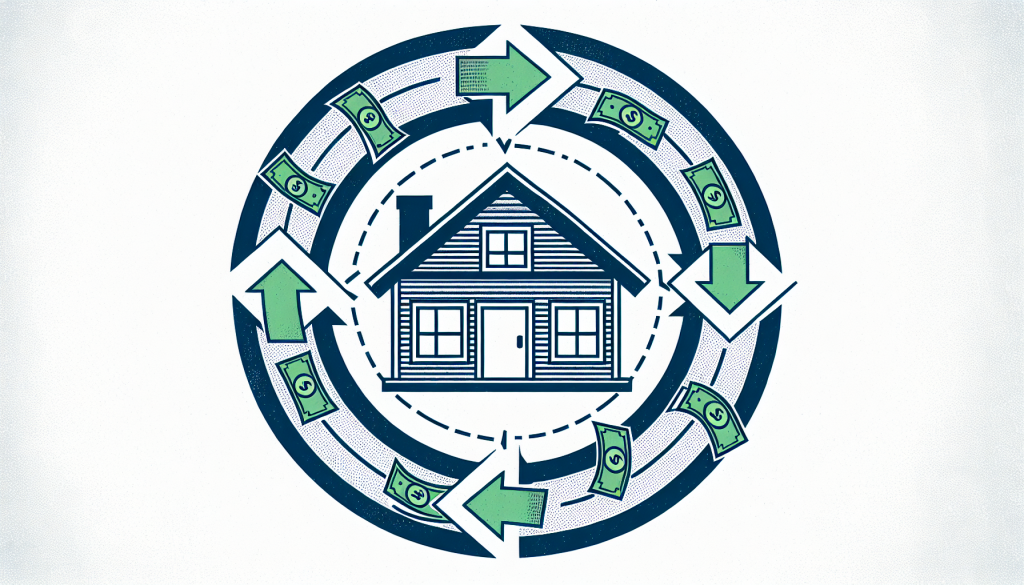Imagine that your golden years could be spent enjoying life to the fullest, without any financial worry. This could be a reality if you understand the mechanics of a reverse mortgage. Tailored for retirees, a reverse mortgage allows you to transform your home – your major asset – into a steady stream of income, fortifying your financial health during retirement. Now, how about we embark on this enlightening journey where unlocking the value tied up in your home could hold the key to a more secure and comfortable retirement.

Understanding Reverse Mortgages
Navigating the world of finance, especially when it comes to homeownership, can feel overwhelming at times. But you’re not alone. You’ve taken an important first step in learning about reverse mortgages and understanding how they can serve as a powerful financial tool in your retirement years.
Definition of a Reverse Mortgage
A reverse mortgage, to begin with, is a unique type of loan that allows homeowners like you to convert a portion of the equity in your home into cash. This is often an appealing choice for retirees as it provides an income stream with no obligation of monthly mortgage repayments.
Basic Principles behind Reverse Mortgages
At its core, a reverse mortgage operates on the basic principle of equity conversion. This means that the equity built up in your home over the years is used to provide you with cash, while the loan amount, including interest and other charges, are recoverable from the sale of your property.
Eligibility Criteria for a Reverse Mortgage
Quality, as with any financial product, is key. But who qualifies for a reverse mortgage?
Age Requirement
One significant criterion for eligibility is age. You have to be at least 62 years old to qualify for a reverse mortgage. It’s designed this way because a reverse mortgage is intended to assist seniors in their retirement years.
Home Ownership and Occupancy Status
In addition to age, you must fully own your home or have a small remaining mortgage balance. Moreover, the home in question must be your primary residence. Vacation homes or rentals don’t qualify.
Financial Assessment
You’ll also undergo a financial assessment. The lender will review your income, assets, living expenses, and credit history to ensure you can continue to fulfill your obligations like property taxes and insurance premiums, despite the absence of regular mortgage payments.
Types of Reverse Mortgages
There are different types of reverse mortgages to choose from, each catering to specific needs.
Single Purpose Reverse Mortgages
Single purpose reverse mortgages are usually offered by local government agencies or non-profit organizations. The lender stipulates a single purpose, such as home improvements or property taxes, and the funds can only be used for this purpose.
Home Equity Conversion Mortgages (HECMs)
These are backed by the U.S. Department of Housing and Urban Development (HUD). HECMs don’t have specific income requirements, and the proceeds can be used for any purpose. They are more flexible but involve more fees.
Proprietary Reverse Mortgages
These are private loans offered by financial institutions. If your home has a higher appraised value and you have considerable home equity, a proprietary reverse mortgage could lend you more money than the other types.
Payout Options
Just as there are different types of reverse mortgages, there are also various ways to receive the loan proceeds.
Lump Sum
Receiving the money in a lump sum may be a good option if you have a large, immediate expense. However, it could also mean higher interest charges as the full loan amount starts accruing interest immediately.
Monthly Payments
Choosing the option of monthly payments provides an income stream, which can supplement your retirement income.
Line of Credit
Having a line of credit allows you to draw on the loan proceeds at any time. What’s more, the unused portion of the line of credit can grow over time.

Interest Rates and Fees Involved
Before signing up, it’s important to understand the costs associated with reverse mortgages.
Interest Rates: Fixed versus Adjustable
While fixed interest rates mean stability and predictability, adjustable rates could lead to lower costs if market rates decrease. However, adjustables can fluctuate, making them slightly unpredictable.
Origination Fee
This is a fee charged by lenders to process your loan. It covers a lender’s operating expenses such as office overheads and employee salaries.
Mortgage Insurance Premium (MIP)
For HECMs, you’ll pay a mortgage insurance premium. This protects you because if your lender fails to make payments due to you as agreed, the FHA will step in to make those payments.
Service Fees
Some lenders may charge monthly service fees for the life of the loan. These cover the cost of servicing your loan.
Implication for Heirs
A reverse mortgage can affect your heirs and any inheritance they may be expecting. Being aware of these implications could help prevent future financial complications.
Repayment of the Loan
Upon passing or selling the home, the reverse mortgage will have to be repaid. This usually involves the sale of the home, with the proceeds paying off the loan balance.
Impact on Inheritance
Because the reverse mortgage is repaid by selling the property, your heirs might receive less from your estate. Should the loan balance exceed the home’s value, your heirs won’t be responsible for the shortfall.
Option of Property Sale
Your heirs also have the option to sell the property to repay the loan, or they can repay the loan through other means if they wish to keep the property.

Benefits of a Reverse Mortgage
Now, let’s look at the benefits of reverse mortgages which make them an attractive option for some retirees.
Financial Security in Retirement
By allowing you to tap into the equity you’ve built in your home, a reverse mortgage provides a financial cushion for a secure and comfortable retirement.
No Monthly Mortgage Payments
Unlike traditional mortgages, reverse mortgages don’t require monthly repayments. The loan is repaid when you move out, sell your home, or pass away.
Flexibility of Payments
As mentioned earlier, you can opt for a lump sum, monthly payments, or a line of credit. This flexibility means you can tailor your loan to your specific needs.
Potential Drawbacks
Alongside these benefits, it’s crucial to consider the potential downsides of a reverse mortgage.
Decrease in Home Equity
Since you’re converting your home equity into cash, the amount of equity in your home will decrease over time.
Potential for Foreclosure
Although you won’t be making monthly mortgage payments, you still need to keep up with property taxes, insurance, and home upkeep. Failure to do so could result in foreclosure.
Costs Associated with Reverse Mortgages
As we’ve discussed, reverse mortgages come with several fees and charges. These can add up and eat into the equity you’ve built up in your home.

Counseling for Potential Borrowers
Given the complexities, potential borrowers are strongly advised to engage in reverse mortgage counseling.
Importance of Counseling
Such sessions can provide you with invaluable information and help you decide whether a reverse mortgage is the right choice.
Finding a Certified Counselor
Look for counselors who are certified by HUD to ensure they have the requisite knowledge and can offer the most accurate information.
Purpose of the Session
Counseling sessions are meant to educate you about the pros and cons of reverse mortgages. They are there to help you make an informed decision.
Alternatives to Reverse Mortgages
Although reverse mortgages can be a useful financial tool, other options may be more suitable depending on your situation.
Traditional Mortgages or Refinancing
Taking out a traditional mortgage or refinancing your current mortgage may allow you to tap into your home equity at a lower cost.
Selling Your Home
Selling your home and downsizing can offer a considerable amount of cash without the costs and obligations associated with loans.
Home Equity Loan or Line of Credit
Lastly, you could consider using a home equity loan or a home equity line of credit. These options may also provide you access to your home’s equity at a lower cost than a reverse mortgage.
In conclusion, understanding the intricacies and implications of reverse mortgages is best done with research, counseling, and careful consideration of your unique needs and circumstances. Here’s to making the best decisions for your financial future!

